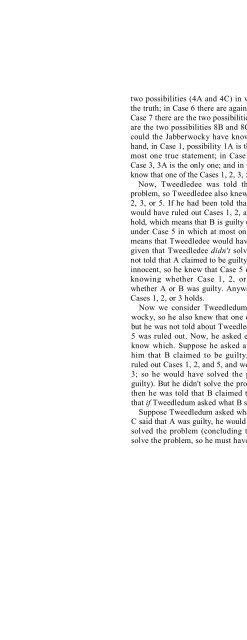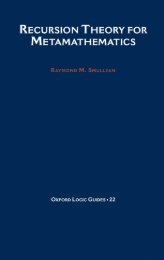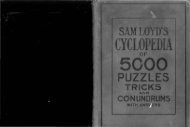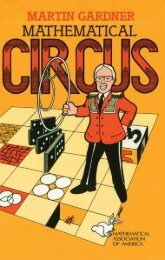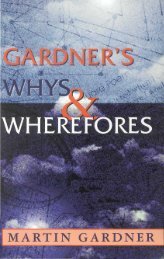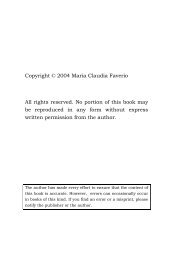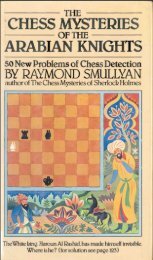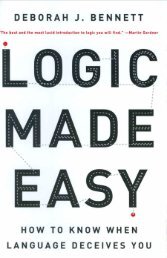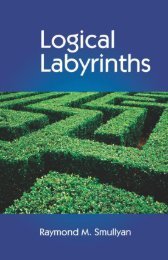Which Alice?
Which Alice?
Which Alice?
Create successful ePaper yourself
Turn your PDF publications into a flip-book with our unique Google optimized e-Paper software.
Solutions to the Puzzles<br />
two possibilities (4A and 4C) in which at most one defendant told<br />
the truth; in Case 6 there are again two possibilities (6B and 6C); in<br />
Case 7 there are the two possibilities 7A and 7C; and in Case 8 there<br />
are the two possibilities 8B and 8C. So, in none of these four cases<br />
could the Jabberwocky have known who was guilty. On the other<br />
hand, in Case 1, possibility 1A is the only one in which there was at<br />
most one true statement; in Case 2, 2B is the only possibility; in<br />
Case 3, 3A is the only one; and in Case 5, 5B is the only one. So we<br />
know that one of the Cases 1, 2, 3, 5 is the one which actually holds.<br />
Now, Tweedledee was told that the Jabberwocky solved the<br />
problem, so Tweedledee also knew that the actual case was either 1,<br />
2, 3, or 5. If he had been told that A claimed to be guilty, then he<br />
would have ruled out Cases 1, 2, and 3 and known that Case 5 must<br />
hold, which means that B is guilty (because 5B is the only possibility<br />
under Case 5 in which at most one true statement was made). This<br />
means that Tweedledee would have solved the problem, but we are<br />
given that Tweedledee didn't solve the problem; therefore, he was<br />
not told that A claimed to be guilty; he was told that A claimed to be<br />
innocent, so he knew that Case 5 didn't hold, but he had no way of<br />
knowing whether Case 1, 2, or 3 held; hence he didn't know<br />
whether A or B was guilty. Anyway, we now know that one of the<br />
Cases 1, 2, or 3 holds.<br />
Now we consider Tweedledum. He was told about the Jabberwocky,<br />
so he also knew that one of the Cases 1, 2, 3, 5 must hold,<br />
but he was not told about Tweedledee; so he did not know that Case<br />
5 was ruled out. Now, he asked either about B or C, but we don't<br />
know which. Suppose he asked about B. If the White Knight told<br />
him that B claimed to be guilty, then Tweedledum would have<br />
ruled out Cases 1, 2, and 5, and would have been left just with Case<br />
3; so he would have solved the problem (concluding that A was<br />
guilty). But he didn't solve the problem; so if he asked what B said,<br />
then he was told that B claimed to be innocent. So we now know<br />
that if Tweedledum asked what B said, then Case 1 or Case 2 holds.<br />
Suppose Tweedledum asked what C said. If he had been told that<br />
C said that A was guilty, he would have eliminated Cases 1, 3, 5 and<br />
solved the problem (concluding that B was guilty). But he didn't<br />
solve the problem, so he must have been told that C claimed that A<br />
181


